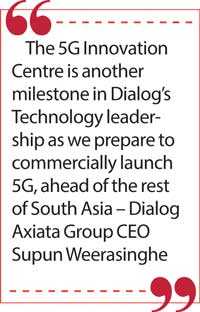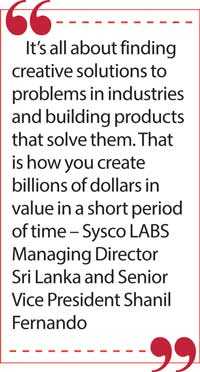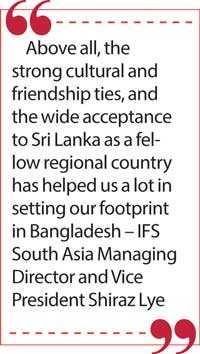Sunday Feb 15, 2026
Sunday Feb 15, 2026
Friday, 24 May 2019 00:00 - - {{hitsCtrl.values.hits}}
Stories of ingenuity and digital disruption
Sri Lanka is home to a rapidly growing ICT/BPM industry that thrives on innovation, tech development, and high-end service standards. Rather than going on the path of competing with other developing countries for headcount based outsourced businesses, Sri Lanka focused on developing a niche and specialised talent base—carving out a competitive position for high-end product and service development and knowledge services.
 As a result, Sri Lanka has continuously maintained an impressive increase in ICT exports revenue over the past decade. More than 350 companies and 85,000 technologically-savvy professionals are employed in the sector, which generated over $ 1.2 billion exports in 2017. Expanding on this momentum, the sector targets to achieve $ 5 billion of exports, provide 200,000 direct jobs and establish 1,000 start-ups by 2022.
As a result, Sri Lanka has continuously maintained an impressive increase in ICT exports revenue over the past decade. More than 350 companies and 85,000 technologically-savvy professionals are employed in the sector, which generated over $ 1.2 billion exports in 2017. Expanding on this momentum, the sector targets to achieve $ 5 billion of exports, provide 200,000 direct jobs and establish 1,000 start-ups by 2022.
While Sri Lanka does not focus on mass capacity based outsourced services, an obsession with innovation and some of the most stringent intellectual property protection regimes in the region has resulted in Sri Lanka becoming a renowned destination for multinationals setting up captive innovation centres.
In addition to the talented workforce, Sri Lanka also has a vibrant startup ecosystem – with co-working spaces, incubators, accelerators and entrepreneur mentoring programs – providing international giants with a myriad of opportunities to foster innovation and drive global success.
Global powerhouses are already reaping the benefits of setting up innovation hubs in the country and below are the success stories of Sysco Labs and LSEG Technology.
Sysco – Sysco LABS
Based in the US and serving over 425,000 restaurants, Sysco is the world’s largest foodservice provider. The company’s operations span four continents and its annual revenue exceeds $ 50 billion.
Sysco’s vision to transform the global foodservice industry led to the acquisition of Sysco LABS – a Silicon Valley-based tech company formerly known as CAKE LABs, with its core engineering team in Colombo, Sri Lanka.
Sysco decided that Sysco LABS would be the ideal partner to take Sysco into the future of foodservice that technology unlocks. Through Sysco LABS, Sysco is looking at ways to completely re-imagine the foodservice industry through technology innovation.
Sysco LABS was already engaged in this through its ingenious restaurant technology platform CAKE, which was disrupting the restaurant customer relationship. But with Sysco’s acquisition and the expansion of the engineering centre in Colombo, Sysco LABS is now looking at every single interaction and touch point ‘from farm to fork’.
The London Stock Exchange Group (LSEG) – LSEG Technology 
In 2008, the London Stock Exchange Group (LSEG) – one of the world’s oldest and largest stock exchanges by market capitalisation – undertook an extensive international search to identify technologies that would transform the efficiency of their operations.
This search led to the discovery of Sri Lanka’s LSEG Technology (formerly known as MillenniumIT). Not only did LSEG find LSEG Technology’s offering to be the most superior solution – beating out global powerhouses such as NASDAQ – but it also led to LSEG buying the company outright in 2009.
Today, LSEG Technology is a part of the London Stock Exchange Group and has released several proprietary products into the market and boasts some 40+ international clients. Listed among the top three in their sector globally, LSEG Technology’s products include the fastest trading platform in the world.
The emergence of Sri Lanka’s ICT industry to become a global innovation powerhouse and creation of such success stories are solely due to the talents of the workforce, the focus on high quality and reliability, and above all ingenuity and creativity of the industry stakeholders.
The Government of Sri Lanka has now taken proactive steps to boost the growth of this industry and have allocated funds to support the achievement of a $ 5 billion export revenue target by 2022. The National Export Strategy’s ICT/BPM growth initiatives are actively promotes the establishment of more Captive Innovation Centres, similar in capacity to those mentioned above—by positioning Sri Lanka as the preferred destination for development and R&D initiatives and attract large enterprise investment.
Sri Lanka’s digital disruptors: A compelling opportunity for global investors
Sri Lanka has built a reputation for churning out world-class solutions for multi-billion-dollar industries around the world. Availability and access to top engineering talent, creativity and resourcefulness, and a collaborative mentality to co-innovate solutions differentiate Sri Lanka from other locations.
Over the past decade, Sri Lanka has emerged as a leading destination for IT products, IT services, and knowledge services. While Sri Lanka may have a smaller workforce compared to its neighbours such as India, the ICT sector has proven over and over again its ability to deliver high-value in the global arena.
The country’s deep niche skills and innovative culture has generated compelling investment opportunities for organisations and individuals looking to push the envelope and stay on the cutting edge of technology. The country is leveraging its prowess in machine learning, artificial intelligence and big data analytics to disrupt traditional industries—by developing domain specific, transformative IP and business products and services. Two classic examples such digital disruptors include:
WSo2 –Toba Capital
Founded in 2005, WSo2 is a world-class open source integration vendor that helps global companies become integration agile. International brands currently execute over five trillion transactions annually using WSo2’s integration technologies. In 2018, Gartner, Forrester and KuppingerCole named WSo2 market leaders in Integration, API Management and Identity and Access Management, respectively.
Driven by this impressive performance, WSo2 has received notable funding from global heavyweights over the years. In its most recent rounds of investment, WSo2 closed a $ 20 million funding round led by Pacific Controls, joined by Toba Capital. Prior to this, the company closed a $ 10 million funding round led by Toba Capital, joined by Cisco and Intel Capital in 2013.
Toba Capital – the California-based VC firm focused on enterprise software and infrastructure – is WSo2’s majority shareholder, with Toba Capital founder, Vinny Smith, being Executive Chairman of WSo2.
Elovate –Tavistock Group
The Tavistock Group –a multi-billion-dollar international private investment organisation –identified Sri Lanka’s immense potential as one of the fastest growing technology markets and was quick to capitalise on this opportunity. In 2018, Tavistock invested in and formed the ElovateGroup –a consortium of Sri Lankan companies providing end-to-end technological solutions across hardware, software, marketing and analytics.
Elovate Comprises of Atlas Labs, a sensor technology company; Pyxle International, a digital transformation and technology company; Trabeya, a data analytics and artificial intelligence company; and Surge Global, a digital marketing/media tech company. Tavistock has significantly expanded operations in Sri Lanka, going from just five employees to a team of 150 people. Through these acquisitions, the Tavistock Group will position Elovate to be a dynamic provider of exceptional solutions in the global technology space.
The emergence of such disruptors is attributed to the ingenuity and creativity of the sector. Identifying the opportunity at stake, the Government of Sri Lanka, through the Ministry of Development Strategies and International Trade (MoDSIT) and Export Development Board (EDB), has designed multiple initiatives under the National Export Strategy to support and develop companies with the potential of becoming the next ‘Digital Disruptors’.
Sri Lanka: The Digital Gateway to Asia
Sri Lanka’s geo-strategic location has always made the country an ideal destination to those who wish to access emerging Asian markets. Global multinationals looking to enter large South Asian economies such as India, Pakistan, and Bangladesh have increasingly utilised Sri Lanka as a testing ground to gauge opportunities and utilise the territory as an innovative incubation hub for the region.
Over the past decade, global multinationals realised that the progressive nature of Sri Lanka’s ICT sector and fast adoption of new technology, makes the country an ideal location to introduce cutting-edge technology, evaluate the product-market fit, and expand to regional markets.
Leveraging Sri Lanka as a test bed has provided global multinationals with many advantages spanning the identification of emerging opportunities in the region, familiarity with market nuances and understanding the cultural fit.
Global companies have also realised that, the ingenuity and creativity of Sri Lanka’s talent base can be leveraged to enhance their offerings helps to localise and enhance global technology, which can then be rolled-out to the South Asian region.
IFS AB
Sweden’s IFS AB – a multinational enterprise software company generating ~$ 600 million in revenue – is present in Sri Lanka via a fully-fledged marketing, sales, consulting and support entity. IFS’s largest R&D centre outside Sweden is located in Sri Lanka and employs over 700 staff, with the country also being home to IFS’s global support and training centre.
IFS began its South Asian regional operations in Sri Lanka in 2002 and used the country to expand its presence to other South Asian countries such as Pakistan and Bangladesh. IFS’ presence in Bangladesh commenced in 2005 with one of the largest web-based ERP implementation projects in the region, implemented primarily by Sri Lankan software engineers and consultants.
Dialog Axiata
The Dialog Axiata Group – a subsidiary of Malaysia’s telecommunications giant, Axiata Group Berhad – recently showcased Sri Lanka’s dominance as a regional telecommunications hub by demonstrating 5G technology for the first time in South Asia.
Dialog Axiata has consistently leveraged Sri Lanka over the years to test next generation technologies. In 2013, Dialog became the first service provider in South Asia to commence commercial operations of mobile 4G services. Following this, Dialog Broadband then launched 4.5G technology establishing yet another milestone in the region’s broadband landscape.
With the aim of supporting the ICT sector to develop similar success stories of innovation and investments, and to promote Sri Lanka’s identity as the ‘Island of Ingenuity,’ the Government of Sri Lanka is investing heavily in a number of strategic initiatives as defined by the National Export Strategy. These initiatives are expected to accelerate the sector’s journey towards becoming the top export revenue generator to the country.
From Iceland to China: Connecting a global fresh fish network
Connecting global markets has always been a core value proposition for Sri Lanka. For centuries the island nation has leveraged its strategic geopolitical positioning to connect the East and the West.
Now, as traditional logistics models are disrupted by technological advancements, geographic location is gradually losing its relevance. Despite this, Sri Lanka looks set to continue being a vital piece of the global logistics puzzle through a transition from one core strength to another: a world class tech industry and strong affinity for disruptive digital innovation.
The country’s robust talent pool and innovative culture has helped it be a part of global supply chains that would never traditionally cross Lankan shores. Nowhere is this better exemplified than in the case of 99X Technology and IceFresh.
99X Technology: Solving global problems through software
Established in 2004, IceFresh specialises in supplying fish procured from Iceland and Norway to the global market. As one would expect, the logistical aspects of this business model present many complications, and IceFresh realised the full extent of this when they attempted to conquer the world’s largest market: China.
The company was using a manual system that simply could not handle geographical constraints posed by the Chinese market. This problem required an innovative and comprehensive technological solution, and IceFresh turned towards Sri Lankan company 99X Technology to help ensure that their fresh fish remained fresh when reaching Chinese customers.
An award-winning niche software product engineering company, 99X has a record of 150+ IT products since its inception in early 2000. Together with IceFresh, the company took on the challenge of transforming IceFresh’s entire system end-to-end, from where the fish were caught, all the way to the point they reached Chinese vendors.
The project posed multiple challenges, especially in terms of aligning the platform with standards and criteria of two very different countries. Additionally, infrastructural barriers such as internet connectivity out of China also led to significant hurdles that the project team needed to overcome along the way.
Despite this, 99X developed a comprehensive supply chain management system for IceFresh, allowing them to sell fresh fish caught in the Atlantic Ocean to Chinese vendors via online stores. The system was also interconnected to several high-profile third-party services and was able to leverage the brand recognition of these to build up customer confidence in IceFresh, allowing it to capture additional market share.
99X continues to be at the forefront of its industry today, driven by its mantra of minimal errors and maximum efficiency. They are one of several Sri Lankan companies that are disrupting markets worldwide through innovative solutions such as the example described above.
The opportunities afforded by the organic emergence of such disruptors have been identified by the Government of Sri Lanka which, through the Ministry of Development Strategies and International Trade (MoDSIT) and Export Development Board (EDB), has designed multiple initiatives under the National Export Strategy to support and develop companies that demonstrate the potential to become the next ‘Digital Disruptor’.